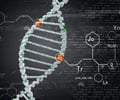Marfan syndrome is a genetic disorder that affects the heart's largest artery, the aorta. Studies were going on to get to the bottom of the disease and researchers at Johns Hopkins University have successfully come up with the treatment. Cozaar is the blood-pressure drug that has shown promise in recent studies for treating the genetic disorder. The researchers at Johns Hopkins University said that the Merck's drug appears to prevent the weakening of the heart's largest artery, the aorta.
Researcher Harry Dietz, said that this drug has the ability to prevent rather than attenuate or respond to manifestations of this disease. The results of the new studies were published in the journal Science. He said that this drug not only prevents the aorta from weakening but also seems to heal the artery if it's already been damaged.Statistics shows that Marfan syndrome approximately affects 30,000 people in the United States. The main feature of this disease is that patients live with the constant risk of sudden death if his or her weakened aorta bursts. Experts believe that thousands of Americans remain undiagnosed with the condition.









